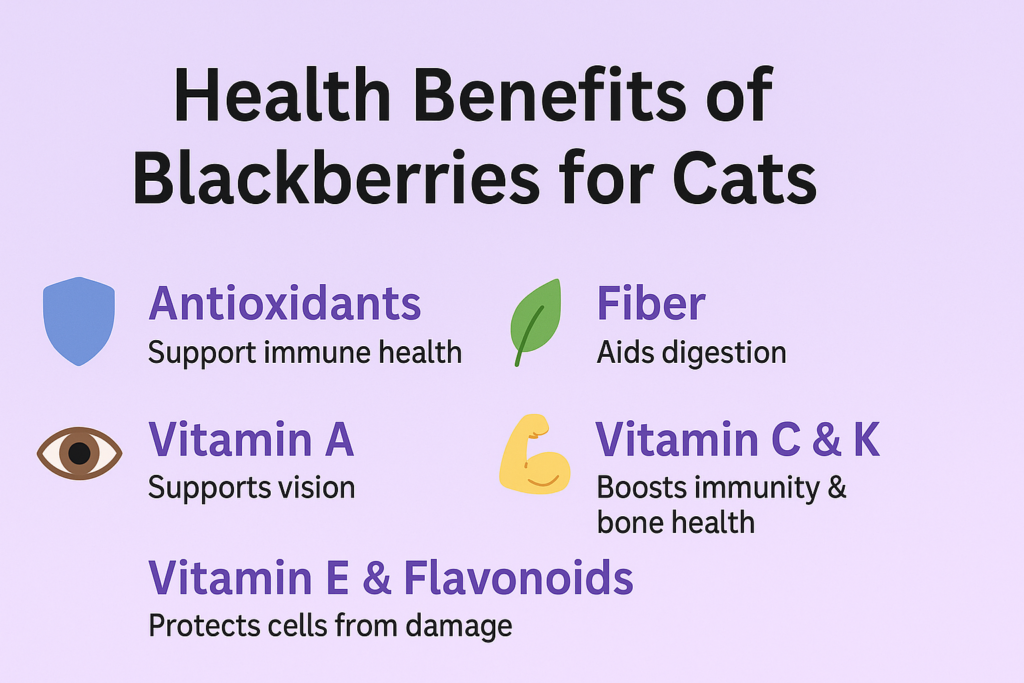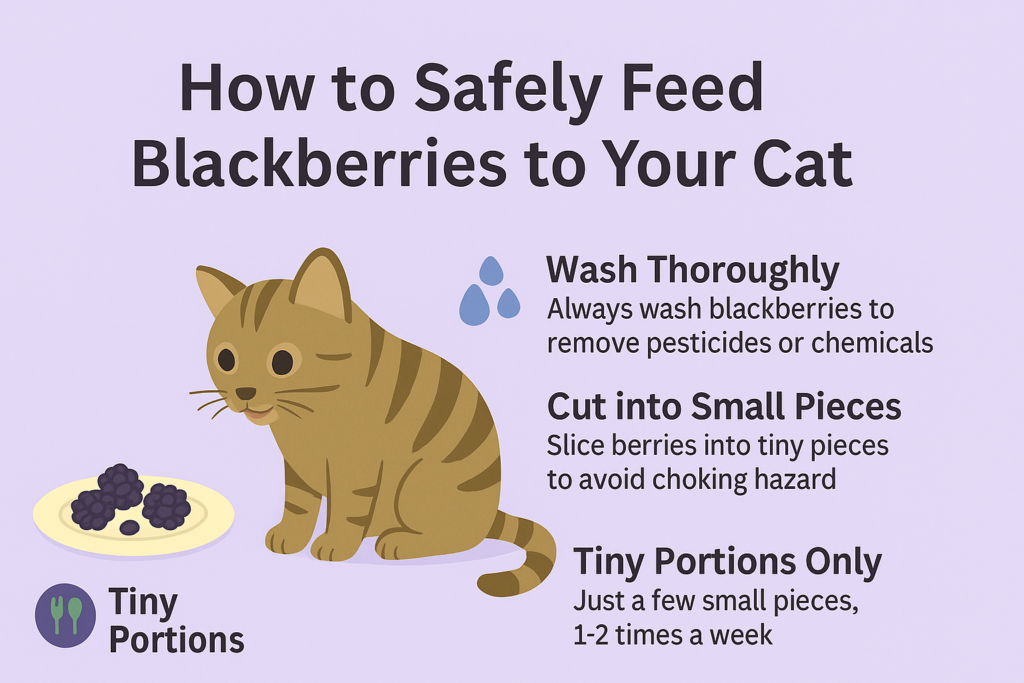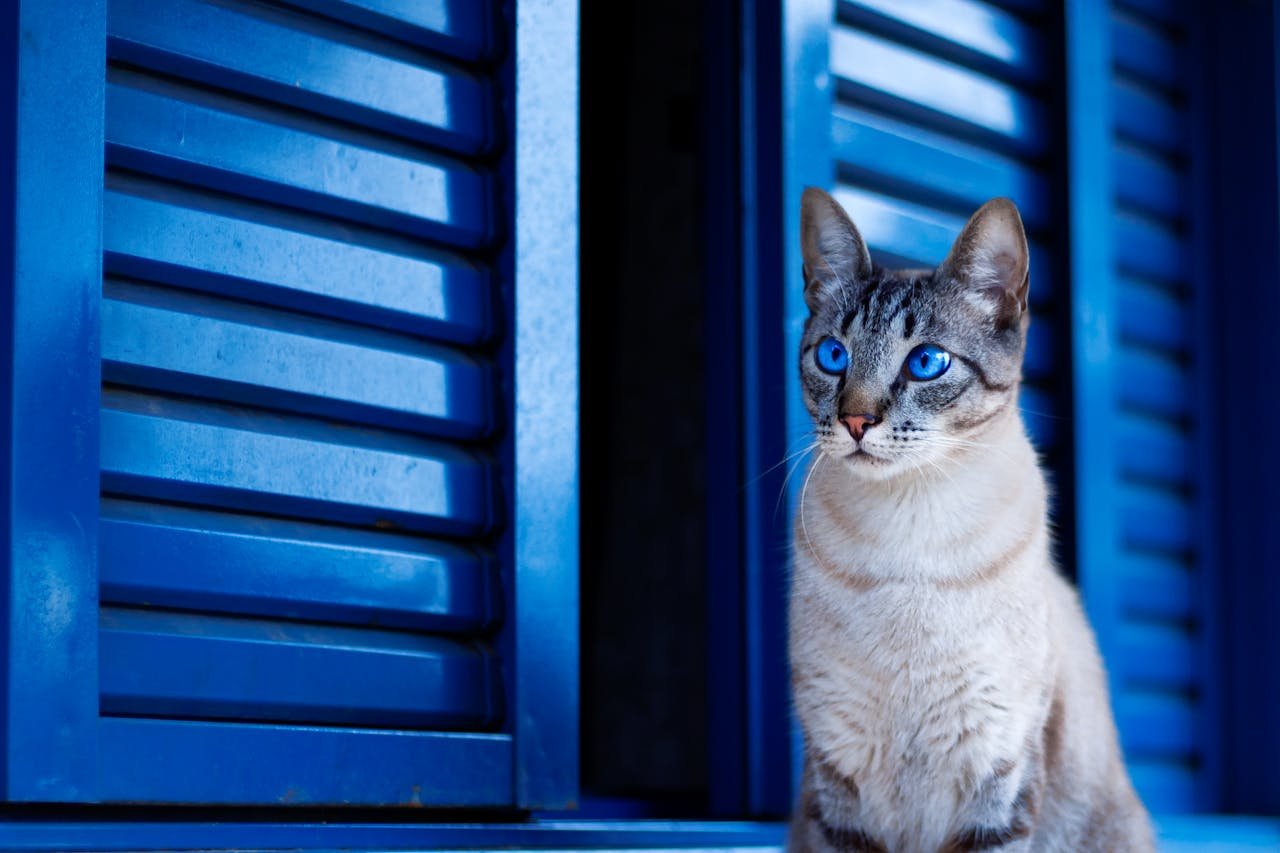Can Cats Eat Blackberries: Benefits, Risks, and Serving Tips
Cats are naturally selective eaters, but some curious cats may show interest in unexpected foods like blackberries. Many pet owners wonder, Can cats eat blackberries safely, and whether doing so could cause digestive upset or toxicity. The good news is that blackberries are safe for cats in small, controlled amounts, making them an occasional treat rather than a dietary necessity. While fruit is not essential for a cat’s nutrition, offering tiny portions of blackberries can satisfy curiosity and provide minor benefits such as dietary fiber and antioxidants. However, it’s important to remember that the primary nutrition for cats should always come from high-quality, animal-based protein, and blackberries should never replace their regular meat-based diet.
Are Blackberries Safe for Cats?
Blackberries are not toxic to cats, which means your feline can safely nibble on them in moderation.. Blackberries can pose a choking hazard due to their size and shape, so it’s important to quarter the fruit into bite-sized pieces before offering it to your cat.
Cats are obligate carnivores, so while blackberries are safe, they should never replace meat in their diet. Additionally, always wash the berries thoroughly to remove pesticides or other chemicals. For added safety and personalized guidance, consult a veterinarian before incorporating blackberries into your cat’s diet.
Related Post: Can Cats Eat Rambutan? A Pet Parent’s Safety Guide
Can Cats Eat Blackberry Yogurt?
While many cats seem naturally drawn to yogurt, it’s important to understand that most felines are lactose intolerant. Products like milk, cheese, and yogurt contain lactose, which is difficult for cats to digest. won’t be deadly, but may cause stomach problems:
- Flatulence – gas buildup in the digestive tract
- Cramping – abdominal discomfort or bloating
- Nausea – signs of stomach irritation
- Diarrhea – loose or watery stools
Professional Tip: Instead of offering yogurt, it’s safer to give your cat fresh or frozen blackberries. This way, your feline can enjoy the taste and minor nutritional benefits of blackberries without the risk of lactose-related digestive issues.
Are Blackberries Bad for Cats?
While blackberries are generally safe for cats in small amounts, there are some risks to keep in mind before offering this fruit. Cats’ digestive systems are designed for meat, not plant-based foods, so introducing blackberries requires caution.
Potential Risks
- Digestive upset: Cats lack the enzymes needed to process large amounts of plant fiber and natural sugars.
- High sugar content: Although naturally occurring, the sugar in blackberries can contribute to weight gain, digestive issues, or long-term metabolic problems like diabetes if given excessively.
- Choking hazard: Whole berries may be too large for some cats to chew or swallow safely, so always cut them into small, manageable pieces.
Do Blackberries Have Any Health Benefits for Cats?
Yes, blackberries can offer some minor health benefits for cats, though it’s important to remember that the portions must be very small. Cats are obligate carnivores, and their main nutrients should come from a balanced meat-based diet, so blackberries should only act as a supplement, not a replacement. That said, blackberries are highly nutritious fruits, rich in antioxidants, fiber, vitamins, and flavonoids, making them a safe and occasionally beneficial treat for curious felines.
The Health Benefits of Blackberries for Cats

Blackberries contain a range of nutrients that may support feline health when fed in moderation:
- Antioxidants: They help neutralize free radicals and support your cat’s overall health.
- Fiber: It improves digestive health and helps regulate stool.
- Vitamin A: Supports vision and skin health while boosting the immune system.
- Vitamin C: Aids in maintaining joint and bone health.
- Vitamin K: Assists in proper blood clotting.
- Vitamin E: Maintains muscle and cellular health.
- Flavonoids: Provide anti-inflammatory and antioxidant benefits.
Key Benefits of Feeding Blackberries to Cats
- Superfood for gut health: Fiber content helps maintain regular digestion and healthy stool.
- Low in fat: A healthy alternative to other human treats, minimizing the risk of obesity.
- Antioxidant boost: Helps reduce tissue and organ damage caused by free radicals and may support long-term health.
- Nutrient variety: Provides vitamins A, C, E, and K, supporting vision, immunity, and cellular health.
Recommended Serving Size for Cats: Always monitor your cat for any digestive sensitivity and consult a veterinarian if your cat has special dietary needs or health conditions.
Alternatives to Blackberries for Cats
While blackberries can be a safe, occasional treat, some cats may not enjoy them, or you might want to provide other healthy snack options. Choosing alternatives that align with a cat’s dietary needs ensures both safety and nutritional value.
Cat-Safe Fruits and Vegetables
- Blueberries: Like blackberries, blueberries are low in sugar, high in antioxidants, and safe in small amounts.
- Cantaloupe: Many cats enjoy the mild sweetness of cantaloupe, which provides hydration and fiber.
- Pumpkin: Plain, cooked pumpkin is excellent for digestion and can help regulate stool.
- Zucchini: Soft, cooked zucchini offers fiber and hydration without added sugar or fat.
High-Protein, Animal-Based Snacks
- Cooked Chicken or Turkey: A lean, meat-based treat that provides essential amino acids.
- Boiled Eggs: Rich in protein and fat, eggs are a nutritious occasional snack.
- Canned Tuna (in water, unsalted): Offers omega-3 fatty acids and protein, but should be given sparingly.
- Freeze-Dried Meat Treats: Convenient, high-protein treats that are specifically formulated for feline nutrition.
How to Safely Feed Blackberries to Your Cat

Although blackberries are generally safe, proper preparation and moderation are essential to avoid choking or digestive upset. Always wash the berries thoroughly to remove pesticides or chemicals, and cut them into small, manageable pieces. Serve blackberries as an occasional treat rather than a staple, and monitor your cat for any adverse reactions such as vomiting, diarrhea, or gas.
Recommended Serving Size for Cats
- Tiny Portions: Only a few small pieces per serving are enough. Cats do not need fruit for nutrition, so less is more.
- Frequency: Offer blackberries once or twice a week at most, ensuring their primary diet remains meat-based.
- Observation: Introduce blackberries gradually and watch for digestive sensitivity, adjusting the amount as needed.
Blackberries vs Other Cat Treats
- Low-Calorie Option: Blackberries are a low-fat option compared to many commercial treats, helping to prevent unnecessary weight gain.
- Fiber and Antioxidants: Unlike most meat-based treats, blackberries provide minor antioxidants and dietary fiber, which can support digestion in small amounts.
- Not a Replacement: Blackberries should never replace high-quality, protein-rich snacks, such as cooked chicken, turkey, or commercially formulated meat treats
Related Post: Can Cats Eat Vegetables? Safe Veggie Guide for Cat
Final Thoughts: Making Blackberries a Safe Treat for Your Cat
Blackberries can be a safe, occasional treat for cats, but it’s essential to remember that they are not a necessary part of a feline’s diet. Cats are obligate carnivores, and their primary nutrition should always come from high-quality, animal-based protein. When offering blackberries, always wash the fruit thoroughly, remove any stems, and cut into small, manageable pieces to prevent choking hazards.
- Moderation is Key: Only a few small pieces per serving, 1–2 times per week, are sufficient. Overfeeding can lead to digestive upset or excessive sugar intake.
- Monitor Your Cat: Introduce blackberries gradually and observe for any signs of vomiting, diarrhea, or gas. Each cat’s tolerance may vary.
- Complement, Don’t Replace: Blackberries should act as a fun, occasional supplement, not a replacement for meat-based treats or a balanced diet.
- Alternative Treats: If your cat isn’t interested or has a sensitive stomach, consider other safe fruits (like blueberries or cantaloupe) or high-protein snacks (cooked chicken, turkey, or freeze-dried meat treats).
FAQs About Blackberries and Cats
Can cats eat blackberries safely?
Yes, cats can eat blackberries in small, controlled portions. They are non-toxic, but should only be offered occasionally as a treat.
How many blackberries can I give my cat at once?
Offer just a few small pieces per serving, 1–2 times per week. Too many berries can cause digestive upset due to fiber and natural sugars.
Are blackberries healthy for cats?
Blackberries provide minor benefits such as antioxidants, fiber, and vitamins A, C, E, and K. However, they are not essential, and cats get their primary nutrition from meat-based diets.
Can blackberries cause any problems for cats?
Overfeeding may lead to vomiting, diarrhea, gas, or weight gain due to fiber and sugar content. Whole berries may also pose a choking hazard, so always cut them into small pieces.
Can kittens eat blackberries?
It’s best to wait until a kitten is older and their digestive system is more developed. Introduce small amounts gradually, and monitor for any digestive sensitivity.
For More Visits: SiameseMania
Also Read: Can Cats Eat Lima Beans? Safety, Benefits & Risks Explained

